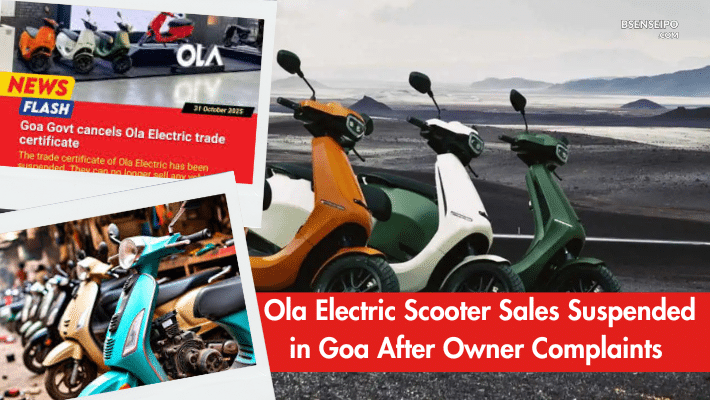Ola Electric Scooter Sales Suspended in Goa After Owner Complaints
Ola Electric scooter Sales have been temporarily halted in the state of Goa after repeated complaints from existing owners about after-sales servicing, vehicle registration issues, and abandoned vehicles at service centres.
What Happened
The Goa Transport Department has suspended the trade certificate of Ola Electric in Goa and blocked all new registrations of Ola Electric scooters or bikes in the state until further notice. This means that the company cannot legally sell new vehicles in the state, nor can new purchasers register them on the Vahan vehicle registration portal.
Why the Suspension
Several issues brought this action about:
- According to local reports, nearly 2,000 Ola Electric scooters remain un-repaired in Goa across the company’s service centres. Owners have lodged complaints that their vehicles are stranded, with little to no servicing taking place.
- Service centres themselves have been reported to be non-functional: vehicles left out in the open, closed shutters, no staff, delayed updates to owners.
- Owners escalated the matter, submitted memorandums to the Chief Minister and demanded suspension of new sales until all existing issues are resolved.
- The transport department responded by halting new sales and registrations, effectively enforcing a sales freeze until the company demonstrates better service/support infrastructure.
Implications and Impact
- For potential buyers: Those interested in purchasing an Ola Electric scooter in Goa will now have to wait until the suspension is lifted or choose another brand/region.
- For existing owners: While the suspension applies to new sales, the action signals the state’s acknowledgement of their complaints and may increase pressure on Ola Electric to address their backlog of repair/service issues.
- For Ola Electric: The suspension harms brand perception, may dent future sales potential in the state, and brings regulatory scrutiny to the company’s servicing model and fulfilment of warranty / after-sales commitments.
- For the EV market: This highlights a risk for electric-vehicle manufacturers/distributors — service network and after-sales are critical to sustaining growth and consumer trust.
What Ola Electric Has Said / Next Steps
While I did not locate a detailed public statement from Ola Electric specific to the Goa suspension, broader context:
- The company has been under regulatory scrutiny: for example receiving a show-cause notice from the Central Consumer Protection Authority (CCPA) for more than 10,000 complaints across India concerning service delays and unfair trade practices.
- The company reportedly told regulators that it had resolved 99 %+ of complaints from a certain period.
- In Goa’s case, the suspension is likely temporary — the transport department has said it will lift the ban once Ola Electric demonstrates “adequate after-sales support infrastructure” and resolves pending service/backlog issues.
What Must Happen for Resolution
- Ola Electric must rapidly clear the backlog of unrepaired vehicles in Goa, ensure its service centres are operational, staffed, and able to handle pending repairs.
- The company should improve turnaround times, spare-parts availability, transparent communications and registration assistance in the state.
- The transport authority will likely demand proof of functioning service network, valid trade certificate renewal, compliant registrations and responsive customer support before re-issuing the sales permit.
- For consumers: Monitoring the situation, maintaining open communication with service centres, and filing complaints through consumer grievance forums may provide recourse.
Broader Take-away
This incident is a reminder that manufacturers and distributors in the EV sector must build not only strong product offerings, but also robust service ecosystems — especially in regions where EV adoption is growing fast. Without servicing, warranty assurances and reliable support, even a well-marketed brand can face backlash, regulatory action, and loss of consumer trust.




